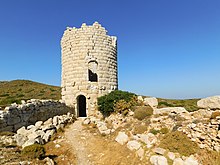Dracanum

Dracanum or Drakanon (Ancient Greek: Δράκονον) was a town of ancient Greece on the island of Icaria. It was located on the easternmost point of the island, on a cape of the same name.[1][2][3][4][5]
According to some traditions, Dionysus was born on Cape Dracanum.[6] According to the fragmentary Homeric Hymn, which commences
For some say it was at Drakanon, others on wind-swept Ikaros, and some say on Naxos, Heaven-born, Eiraphiotes,[7] but others by the deep-eddying river Alpheios, that Semele conceived and bore you to Zeus who delights in thunder. And others, lord, say that you were born in Thebes; but they are lying, for the father of men and gods bore you far away from men, hiding you from white-armed Hera. There is a certain Nysa, a very high mountain blooming with forests, far from Phoenike, near the streams of Aigyptos... (Shelmerdine translation)[8]
Its site is located near modern Phanari.[9][10]
References
- ^ Strabo. Geographica. Vol. xiv. pp. 637, 639. Page numbers refer to those of Isaac Casaubon's edition.
- ^ Hom. Hymn. 34.1; Diodorus Siculus. Bibliotheca historica (Historical Library). Vol. 3.66.
- ^ Pliny. Naturalis Historia. Vol. 4.23.
- ^ Stephanus of Byzantium. Ethnica. Vol. s.v. Δράκονον.
- ^
 Smith, William, ed. (1854–1857). "Icarus". Dictionary of Greek and Roman Geography. London: John Murray.
Smith, William, ed. (1854–1857). "Icarus". Dictionary of Greek and Roman Geography. London: John Murray.
- ^ Theocrit. Idyll. 26.33.
- ^ Eiraphiotes: "Insewn". Dionysus, in Olympian myth, was sewn into the thigh of Zeus, who brought the prematurely delivered infant to term.
- ^ These fragmentary lines are preserved in a quote by Diodorus Siculus, 3.66.3, who attributes them to Homer himself. "All these sites boasted connections with the worship of Dionysos in antiquity," observes Susan C. Shelmerdine, The Homeric Hymns (Focus Classical Library), 2000: 27
- ^ Richard Talbert, ed. (2000). Barrington Atlas of the Greek and Roman World. Princeton University Press. p. 61, and directory notes accompanying. ISBN 978-0-691-03169-9.
- ^ Lund University. Digital Atlas of the Roman Empire.
![]() This article incorporates text from a publication now in the public domain: Smith, William, ed. (1854–1857). "Icarus". Dictionary of Greek and Roman Geography. London: John Murray.
This article incorporates text from a publication now in the public domain: Smith, William, ed. (1854–1857). "Icarus". Dictionary of Greek and Roman Geography. London: John Murray.
37°41′14″N 26°21′43″E / 37.687344°N 26.361812°E
